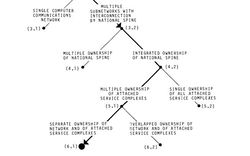Internets Past
Text by Evgeny Morozov
In March 2000, speaking about China, Bill Clinton famously said that trying to censor the Internet is like trying to nail Jell-O to a wall. Of course, he was proven completely wrong by the efforts of the Chinese government not only to restrain the activities of American technology firms but to actually create an Internet of their own. Which was a very bizarre development, because, instead of actually accepting this idea that the Internet, like capitalism, arrives kind of in a whole package, and you can either accept it or reject it—the dominant logic of many people in this field in the 1990s—the Chinese did something very particular. Not only did they reject the idea that capitalism cannot have Chinese characteristics—or Communism, depending on how you evaluate the current situation in China—they also rejected the idea that the Internet cannot have its own particular characteristics.
The idea that you can somehow deviate from what everybody else believes the Internet to be and develop your own mini-Internet would not be new to anybody who actually looked at how networks functioned in the 1970s, but it seemed so new to many of us in the 2000s. You can’t imagine how many people a decade ago were writing editorials and opinion pieces saying that the Chinese, by controlling the Internet, were about to cut themselves off from the global economy. They will be shooting themselves in the foot by banning Google and Facebook from operating in their countries. They will essentially be travelling back in time.
Now, a decade into it, we see that the idea of the Chinese Internet, which is very peculiar, is not a non-Internet. They have search, they have social networks, they have payment systems, they have chats. All of those, of course, are provided on a very different model from the one that most of us in Western Europe and North America depend on. Nonetheless, they get it, and they are the only country at this point that has its own domestic Internet industry that not only competes with but actually rivals that of the United States. Their technology companies—Alibaba, Tencent, Baidu, JD.com—are roughly the same size as the likes of Google, Facebook, and Microsoft. Ten or fifteen years into the experiment, you can see that the idea of the Chinese Internet is not only still with us, but it’s actually perhaps more robust than the idea of the Global Internet that everybody was warning China not to reject.
The reason why I’m giving you this example is that if you actually go and dig a little bit deeper into the history of what was happening in the 1960s and 1970s, you see that a lot of countries were quite concerned about the growing dependence of their economies on foreign technology companies and providers. Because they understood that computerization and digitization of their economies also meant that, ultimately, they will become dependent upon the services of companies that they did not control; and they will become dependent upon other countries. That became very obvious for a lot of countries in the developing world, the so-called Non-Aligned Bloc, or the Group of 77, which tried to build what was then know as “New World and Information Communication Order.” It was basically an effort at the level of the United Nations to resist this idea that information should flow freely across borders in a way that these countries wouldn’t have any defence against the efforts of foreign (mostly American) companies to come in and extract whatever data they were producing and send it somewhere else, or offer their services domestically so that the domestic industry wouldn’t be able to grow.
Canada was actually in the avant-garde of this fight. The Science Council published report after report advocating for something that back then was called technological sovereignty. The idea was that if you do not control your own technology industry, if you do not control your networks and your data banks, you will end up completely losing control of them and you’ll end up depending on American firms. That vision and that critique was, of course, defeated, mainly by a lot of neo-liberal think tanks.
One of the reports from the Science Council, A Trans-Canada Computer Communications Network, which recommends building in Canada in 1971 something very much like what we today understand as the Internet, warns that “a ‘laissez-faire’ attitude will eventually result in the supply of most computing and information services via spur lines from US computer communications networks. Such an outcome is completely unacceptable in economic and social grounds.” It goes on and on and on, but basically it’s an idea for how you can actually connect all of the parts of society, all of the parts of the economy, in a way that will be fair, that will be just, that will be transparent, and where you will actually have society exercising some basic control.
In France some of these efforts did pay off in a very bizarre, technocratic, top-down way. Minitel—which is something that is not the Internet by any means, and it eventually lost—was really meant to be a local network, a national network, satisfying the needs of French citizens under the control of the mostly technocratic state.
Most of the local visions outside of France were defeated. However, if you go and study reports like the one I’ve just read you, you will see that there is no trace of the noosphere, there is no trace of cyberspace, there is no concepts that I would say are mostly ideational—which might sound very tautological, but there is a language of political economy and geopolitics underwriting most of those discussions. The idea and division in many of these reports, both from the developing countries and from countries like Canada, is quite obvious. There is something structural happening at the level of the economy, there is new type of power that is grounded in technology networks and data, and we are about to lose that power. That language gradually disappears from how we think about technology, how we think about networks, and how we think about data, so that by the early 1990s the perspective that becomes dominant and hegemonic in how we think about technology is one that is informed by this imagery and imaginary, if you will, of the Internet.
The concerns become rather pragmatic, almost legalistic. Even discussing a lot of openly and explicitly political issues related to copyright reform or related to surveillance, the subject becomes increasingly cut off from questions of trade, political economy, and industrial development, which was still the vocabulary that most of the people participating in this debate used in the 1970s. Instead, the debate becomes focused very much on legal norms, on the need to foster and promote innovation; and it becomes focused on mostly the needs of American institutions. This is why we spent so much time in the 1990s debating about freedom of expression on the Internet and the constitutional rights related to freedom of expression and so forth: in part because it reflects the hegemonic status of the United States in the world.
Now you can see how this discourse of the Internet eventually leads itself to a very different conception of what kind of politics are possible and what kind of politics ought to be conducted around technology. And this brings to me the substance of actually what I wanted to say, which is that this imaginary of the Internet shapes quite a bit the kinds of struggles that we engage in. If, for example, you look at the struggles over net neutrality in the United States, you can see how in the very name of the concept “net neutrality,” you already have the concept of the Internet embedded. But you can also see how some of the other concerns I have flagged about this Internet discourse are also present.
In some sense the idea behind net neutrality is quite evident and simple, and does not need much justification. It’s the idea that operators of networks should not discriminate against different types of content that derive from different activities that people pursue as they use those platforms. Whether I am watching a highly educational film or whether I am downloading pornography, I should be doing it at the same speed. If you look closely at this political fight and at the concept that informs it, you can see that already in it there are certain specific assumptions about how the world works. The implicit assumption is that telecommunications is by default privatized, so it’s already in the hands of private companies who are just going to manage it and we cannot question the political economy of ownership of our telecommunications, or the ownership of data that it generates. All we can question are the kind of deviations from ideal behaviour that we would like to foster. We can impose rules on what these companies can and cannot do, but we are not going to debate alternative ways to organize society and to organize telecommunications. Right? That is clearly something that is left unconscious and unsaid in this concept.
The second problem is that for a lot of people who associate themselves with progressive forces, net neutrality becomes a rallying cry. It becomes something that they support and would like to promote and endorse, but it’s no longer because they would like to create a society that is just, that is based on solidarity, that is based on respect. Mostly it’s because they are convinced that net neutrality is the best way to foster innovation and this is how we are going to create more and better apps and this is how we are going to restrain the power of so-called incumbent providers of telecommunications services.
But the problem is, you do not necessarily want to keep your platforms neutral if what you’re interested in is redressing certain deficiencies in terms of how society is organized. We do not have a neutral tax system, right? We have quite a lot of unequal and un-neutral mechanisms through which power is policed and power is exercised. To be honest, I see nothing wrong with Goldman Sachs enjoying a slower connection to the Internet than an orphanage or university. Nor do I see anything particularly bad about people enjoying slower connections to Bloomberg Terminals than they would to library ones.
The idea that we really need to have net neutrality in place because this is how we are going to foster innovation is in some sense already a tacit acceptance of the end of politics in any kind of broad meaningful sense. We are no longer even trying to think about ways in which certain ideals can be achieved; we are just trying to more or less make capitalism work better. How do you make capitalism work better? We create environments and conditions where innovation can accelerate and grow faster. In that sense you can see how this idea of the Internet, and this idea that we need to keep it neutral, accelerates certain rather dangerous trends in society.
You can see how our reading of the history of the Internet also lends itself to a prescriptive program for the future, and, depending on what kind of history of the Internet you’re going to come up with, will also determine what kind of future and what kind of struggles you are going to come up with in the time ahead.
An alternative path—an alternative way forward—I would argue, would not necessarily require us to keep on digging into the archives in order to find the actual first use of the terms “Internet” or “cyberspace,” in order to tell a more truthful story—a more truthful representation of what the Internet is or was, and what it it’s meant to be and what its future should be. It would actually require, probably, going back to an earlier way of talking about technology, which as I pointed out to you, you actually had here in Canada partly thanks to reports like A Trans-Canada Computer Communications Network. That would mean that we bring issues related to trade—global trade, especially—back on the agenda. We’ll need to bring questions of political economy back to the agenda. We’ll need to start thinking a little bit better about corporations as political actors; and technology corporations as not just digital equivalents of Human Rights Watch and Amnesty International but as powerful commercial players with their own agendas and their own lobbyists and their own needs.
This will require quite a radical departure from perceiving the world from the perspective of the Internet in order to identify some of the key factors that contributed to its development. We’ll need to perceive the world from some other vantage point, and that vantage point might be the interests of citizens, the interests of workers, or the interests of someone else, depending on what vantage point you yourself would like to take. There are quite a lot of substantial issues that we really need to address which we are not really able to address if we keep on operating in the kind of thought that gave us concepts like net neutrality. Because the only paradigm that is emerging from that field is something along the lines of we need ethical algorithms, we need more data protection, we need more rules for the companies who are supposed to be eternal and not to be questioned. There is no questioning of the underlying political economy of algorithms, artificial intelligence, or any of that. There is only questioning of what kind of ethical rules can be attached on top of them.
And this is where I think the Internet—or you can say, maybe, capitalism, neo-liberalism—has had its greatest coup: it has made most of us believe that to be anti-Internet actually means to be anti-Modern and technophobic. If you open any newspaper or listen to any popular program on TV, this is what is meant when they say that someone is against the Internet. However, in this alternative, post-Internet conception that I have tried to outline here, to be anti-Internet means something very different.
A Trans-Canada Computer Communications Network does not seem to be anti-modern. In fact, it’s hyper-modern. It wants to build networks. It wants to interconnect everything. It’s also not technophobic. Yet I would argue it’s also not necessarily pro-Internet. It’s a way of thinking that makes the term anti-Internet, as it’s used now, mean something else entirely. Reports like this might mean to be anti-imperialism, might mean to be anti-capitalism, might mean to be anti-neoliberalism, it might mean to be something else. But that something has very little to do with either modernity or technology as such, and this is where I think, in some sense, the very concept and idea of the Internet is doing quite a lot of free work—especially free publicity and lobbying work—for many companies in Silicon Valley and elsewhere. Because it disarms us of the conceptual apparatus to think of those firms as firms, and not as some benevolent builders of this greatest infrastructure of humanity that is going to create a Global Village.
It’s by closing that route to depriving us of this conceptual apparatus that I think an alternative politics can be built. The real goal here, I think, should be to move away from this idea that to be anti-Internet you must also be anti-Modern and anti-technological. We should move to a very different field where we will in fact forget the idea of the Internet, because I do not think that we will be able to win that fight and re-establish this more political approach that would have teeth to fight against this big tech industry in a way that recognizes them for what they are: powerful political actors with a lot of lobbyists, a lot of power, and a lot of interests that might generate a lot of short term welfare benefits for a lot of us but have heavy long term costs.
I think we really need to develop a more robust way of thinking, which would be very hard if we stick to the idea and the notion and the conceptual vocabulary of the Internet. The positive side is that the changes that have happened at the technological and structural levels in the past decade suggest to me that the idea of the Internet is less prevalent than it used to be. As our cities become “smart,” as our houses become “smart,” as our mattresses become “smart,” the talk around it is unconcerned with the existence of cyberspace, or the existence of the Internet. Essentially, as everything in our lives becomes digitized, this discourse of everydayness kind of takes over the discourse of the Internet, while still leaving a very deep imprint on the conceptual apparatuses that we use to think through how to fight back.
So we should not mistake the disappearance of the term the Internet from our conceptual vocabulary for victory. In fact, it’s not enough to forget the Internet. We must also forget all of the strategies and fights that it has introduced into our political vocabulary. And this is where I think some kind of a history would in fact be needed. While writing a history of the Internet might itself be pointless from where I stand, writing a history of how we talk about the Internet might be a little more fruitful. That does not mean that we shouldn’t be writing histories that would also try to uncover efforts that point to alternative paths that were not taken and alternative languages that were used. All of that ought to be done as well, but it’s very important to understand the conceptual residue left in our political struggles by that term, the “Internet.”
Evgeny Morozov is a technology theorist and critic. This article is adapted from a talk he gave at the CCA in December 2017 as part of Come and Forget, a series of speculative historical erasures. You can watch the entire lecture on our YouTube channel.

















